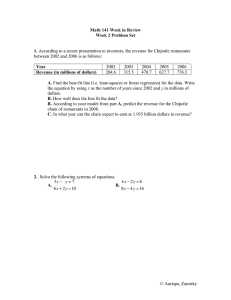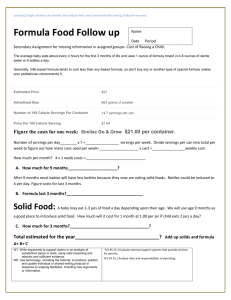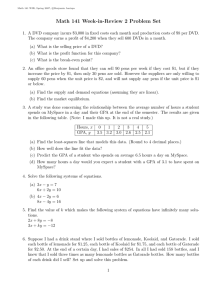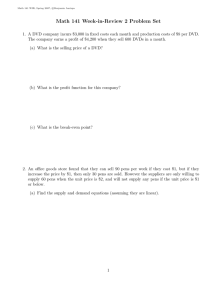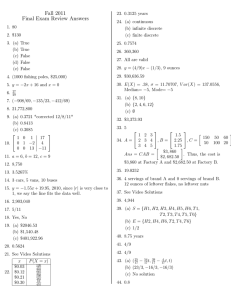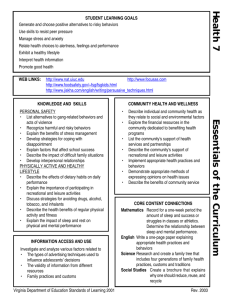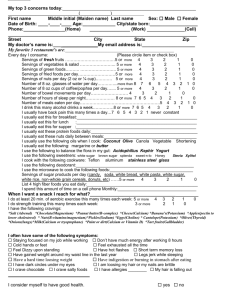between 2002 and 2006 is as follows: 2002 2003
advertisement
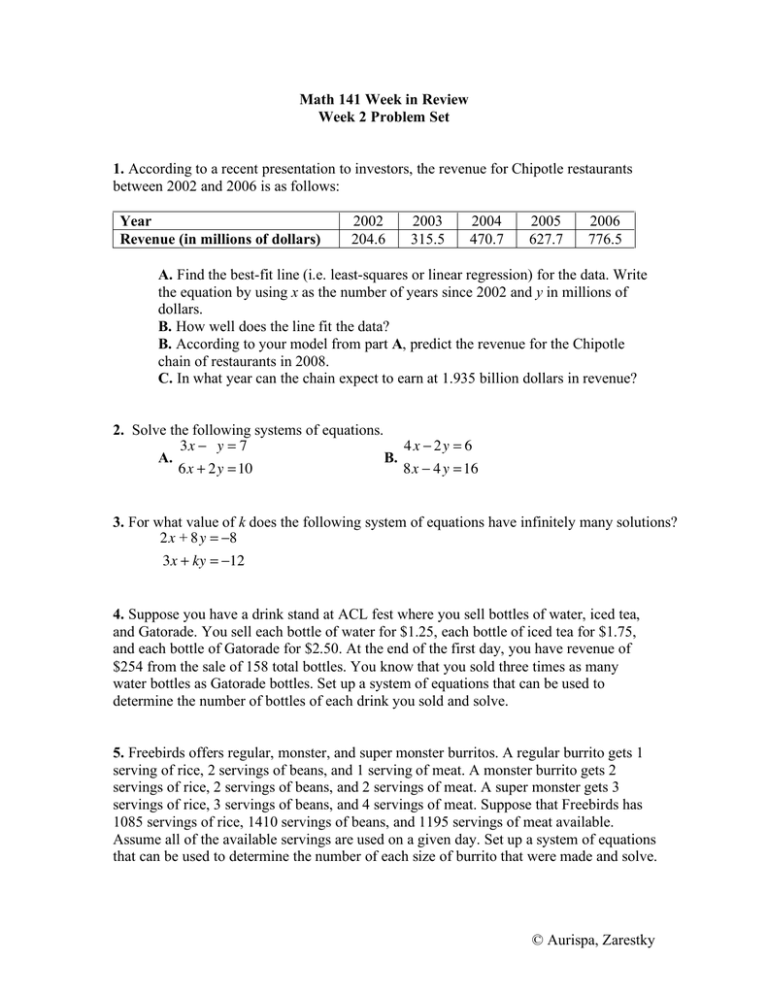
Math 141 Week in Review Week 2 Problem Set 1. According to a recent presentation to investors, the revenue for Chipotle restaurants between 2002 and 2006 is as follows: Year Revenue (in millions of dollars) 2002 204.6 2003 315.5 2004 470.7 2005 627.7 2006 776.5 A. Find the best-fit line (i.e. least-squares or linear regression) for the data. Write the equation by using x as the number of years since 2002 and y in millions of dollars. B. How well does the line fit the data? B. According to your model from part A, predict the revenue for the Chipotle chain of restaurants in 2008. C. In what year can the chain expect to earn at 1.935 billion dollars in revenue? 2. Solve the following systems of equations. 3x ! y = 7 4 x ! 2y = 6 A. B. 6x + 2y = 10 8x ! 4 y = 16 3. For what value of k does the following system of equations have infinitely many solutions? 2x + 8y = !8 3x + ky = !12 4. Suppose you have a drink stand at ACL fest where you sell bottles of water, iced tea, and Gatorade. You sell each bottle of water for $1.25, each bottle of iced tea for $1.75, and each bottle of Gatorade for $2.50. At the end of the first day, you have revenue of $254 from the sale of 158 total bottles. You know that you sold three times as many water bottles as Gatorade bottles. Set up a system of equations that can be used to determine the number of bottles of each drink you sold and solve. 5. Freebirds offers regular, monster, and super monster burritos. A regular burrito gets 1 serving of rice, 2 servings of beans, and 1 serving of meat. A monster burrito gets 2 servings of rice, 2 servings of beans, and 2 servings of meat. A super monster gets 3 servings of rice, 3 servings of beans, and 4 servings of meat. Suppose that Freebirds has 1085 servings of rice, 1410 servings of beans, and 1195 servings of meat available. Assume all of the available servings are used on a given day. Set up a system of equations that can be used to determine the number of each size of burrito that were made and solve. © Aurispa, Zarestky 6. State whether the following matrices are in row-reduced form. If the matrix is NOT in row-reduced form, identify the next row operation needed in the Gauss-Jordan Elimination Method. !1 0 0 2$ !1 2 0 3$ # & A. #0 1 0 3& B. # & "0 0 1 4% #"0 1 2 4&% "1 2 C. $ #0 1 3% ' !2& "1 0 0 2 % $ ' D. $0 !1 3 !4' $#0 0 0 0 '& 7. Perform the next three steps of Gauss-Jordan elimination. Indicate the row operations. "1 2 4 2% $ ' 3 !9 12' $0 $#!2 !4 2 1'& 8. Solve the following systems of equations. If there are infinitely many solutions, write the solution in parametric form and give 2 particular solutions. x = !z ! 2 x + 2y + z = 3 x + y + z = !2 A. B. 3x + 3y + 3z = 7 3x + 2y + 2z = !3 2x + y + 2z = 1 y = 2 ! 2x 2x + y ! z = 0 C. x ! 3y + z = 1 x + 4y ! 2z = !1 x + 2y + z ! 3w = 4 D. !2x + y + z + w = 2 !x + 3y + 2z ! 2w = 6 © Aurispa, Zarestky
